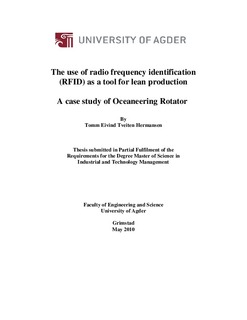| dc.description.abstract | Oceaneering Rotator is a world leading supplier of advanced hydraulic control systems and
valves to the offshore oil and gas industry, and a wholly owned subsidiary of Oceaneering
International Inc. All functions of the company are based in Nodeland, 13 kilometres west of
Kristiansand. All of Rotator’s products are produced in low volumes, except for the 15-series
HCV (Hydraulic Control Valve) with a maximum annual production of 4,000 valves. The
CTV (Chemical Throttle Valve) is Rotator’s most advanced and complex product, and is
produced in small quantities of 100 or less valves per year. Combined, the 15-series HCV and
CTV represent the products with most locally produced parts, and they are the backbone of
Rotator’s production. Therefore, they are chosen as study objects for this project.
The subject for the thesis was chosen based on curiosity of Radio Frequency Identification
(RFID) and its potential uses for production companies. RFID is basically a system that
enables wireless radio communication between readers and small tags placed on containers or
products within the range of the readers to exchange information about the tagged items and
their location. The technology is continuously improving, and has become the most powerful
and versatile tool for automated real-time information management in factories and supply
chains (Sweeney II, 2005).
Lean production principles are known to be one of the most efficient tools to optimise
production with its tradition in Japanese car production (Taylor & Brunt, 2001). Lean
production consists of several principles and philosophies aimed at reducing waste, variability
and lead times in production while enhancing transparency and flexibility. This project
investigates how lean production principles as a framework for production improvement can
be combined with RFID as a tool for lean production implementation and sustainment at
Rotator. If lean production principles can be combined with RFID and used at small and
medium sized companies, it could be a great contribution to ensuring the profitability of these
companies. | en_US |
